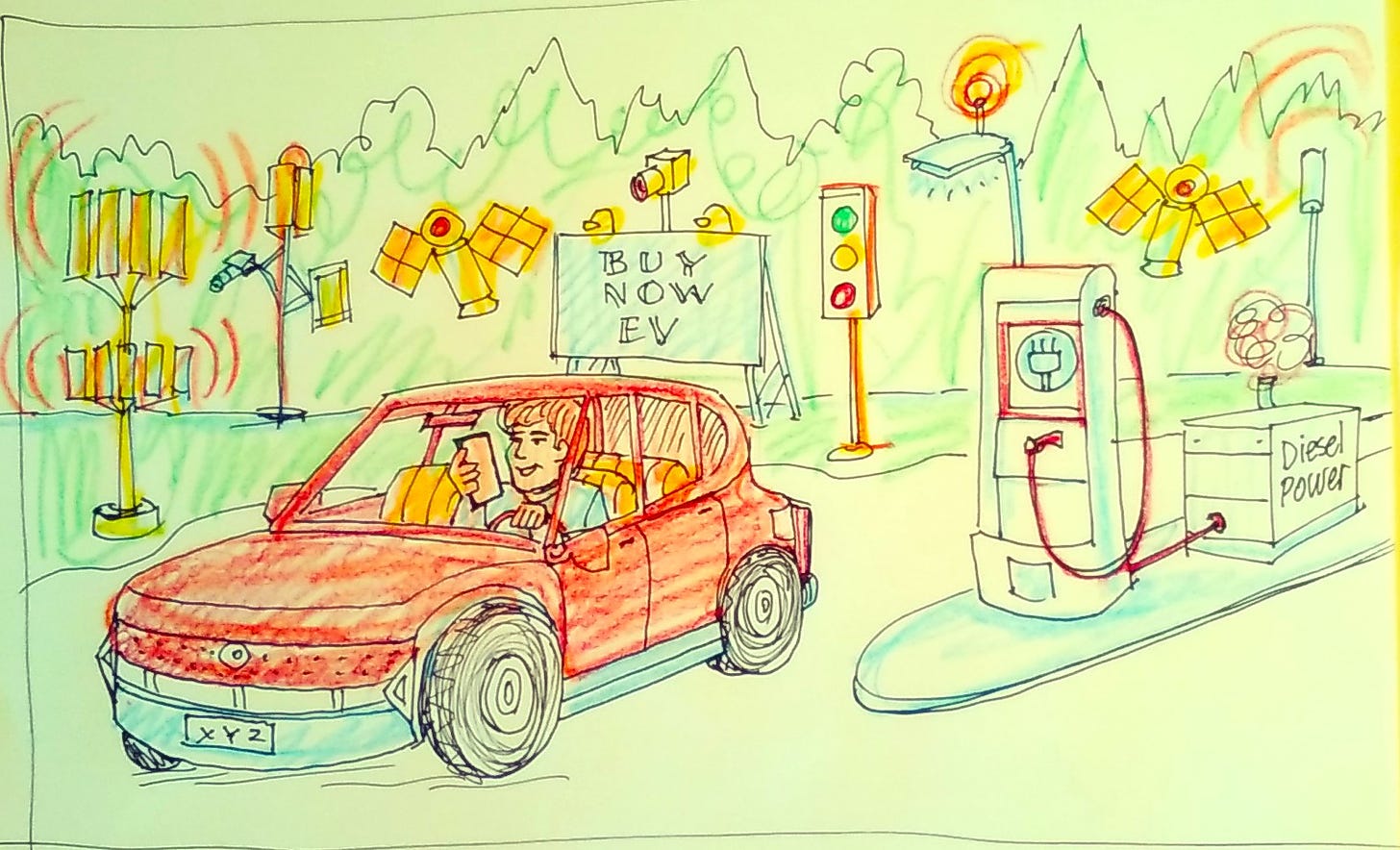News Items You Might Have Missed, re: Tech & Not a Drop of Water to Drink?
This is not a happy feel-good post but ends with some inspiring news you probably don't see on your mainstream feed.
Images courtesy Floris Freshman
“This story pushes us to consider the material impacts of computation and the trade-offs we make when companies push us to adopt more resource-intensive digital tools.” - Paris Marx re; materialism
Some topics that those who are thinking about the true costs of tech are thinking about: Patricia Burke with Flo Freshman
Society is sleepwalking towards a dramatic increase in the consumption of water and energy in order to support generative AI and ChatGPT; with access to clean water and electricity still not available in many parts of the world, and with utility infrastructure across the country that has not been constructed or maintained adequately to protect the grid from EMPs and solar flares.
Let’s not think of this as progress or glorify the politicized idea of ‘addressing the digital divide.’
Here are some topics that those who are thinking about the true costs of tech are thinking about: infrastructure; energy; water; Pavlov’s dogs: children, mining, and e-waste: wireless as an environmental pollutant, and ‘clean’ energy-fueled aggression that sustains global inequities and violates individual and community rights, and the Rights of Nature.
Replace that bowl of dog food with a cell phone.
Pavlov’s Dogs: What associations does society promote for cell phones and the expectation /demand for ubiquitous connectivity?
Kenda Cherry of VeryWell Mind wrote, “Pavlov's Dog: A Background” Ivan Pavlov was a noted Russian physiologist who won the 1904 Nobel Prize for his work studying digestive processes. While studying digestion in dogs, Pavlov noted an interesting occurrence: His canine subjects would begin to salivate whenever an assistant entered the room. In his digestive research, Pavlov and his assistants would introduce a variety of edible and non-edible items and measure the saliva production that the items produced. Salivation, he noted, is a reflexive process. It occurs automatically in response to a specific stimulus and is not under conscious control. However, Pavlov noted that the dogs would often begin salivating in the absence of food and smell. He quickly realized that this salivary response was not due to an automatic, physiological process, Based on his observations, Pavlov suggested that the salivation was a learned response. Pavlov's dog subjects were responding to the sight of the research assistants' white lab coats, which the animals had come to associate with the presentation of food. Unlike the salivary response to the presentation of food, which is an unconditioned reflex, salivating to the expectation of food is a conditioned reflex.”
Simple Psychology reports that “Ivan Pavlov’s key contribution to psychology was the discovery of classical conditioning, demonstrating how learned associations between stimuli can influence behavior.” (This discovery forms the foundation for the marketing industry, for example, the conditioned belief that unstable, tippable SUVs that exceed the capacity of highway guardrails are ‘safer.’)
In the same way that Pavlov altered the inborn physiology of dogs, humans (including addicted children) have had their physiology altered - by devices.
The window that the researchers used to observe the dogs has been replaced by an army of voyeuristic corporations, investors, the military-industrial complex, app developers, marketers, surveillance interests, and hackers.
What indoctrinated associations/learned responses and political and economic drives justify cell phones and required infrastructure???
A. Safety? B. Connection? C. Entitlement to a Basic Human Right (via the United Nations)?
Whose safety, connected to what, and whose human rights?
The image of the tethered dog includes a device that measures salivation. Horrific images of similar experiments on orphaned children are HERE. We have not stopped harming children, (but not only via placing them at risk via access to social media, and tech addiction……)
The privilege of sending texts and selfies and searching social media is financed by children in the global South, and by the Nature environment
Cellphone connectivity is being bult on the backs of children working in mining and e-waste disposal outsourced to impoverished nations.
In addition, the more that consumers ignore the unconscious demand for more data, the more justification for data centers. Can we catch ourselves in the act?
Futurism.com explained, AI'S OUTRAGEOUS ENVIRONMENTAL TOLL IS PROBABLY WORSE THAN YOU THINK WOW, THAT'S *BAD.* “ [] as Wired reports, the way data centers waste water is even worse than how households would waste it by leaving the tap running. "The water that is available for people to use is very limited," Shaolei Ren, a responsible AI researcher at UC Riverside, told the magazine. "It's just the fresh surface water and groundwater. Those data centers, they're just evaporating water into the air." "When we get the water from the utility, and then we discharge the water back to the sewage immediately, we are just withdrawing water — we're not consuming water," Ren continued, (as communities of ‘conservationists’ buy into the idea that wireless ‘smart’ water meters with built-in obsolescence cycles are needed - to transmit usage).
"A data center takes the water from this utility, and they evaporate the water into the sky, into the atmosphere." And once evaporated, that water doesn't come back to Earth for another year.”
Climate? anyone? Hydrological cycle, anyone? Drought, anyone?
Cognitive Dissonance and “Doing Good”
See: Electric Vehicles: The Electromagnetic Environmental Impact How EV Adoption Could Create Uninhabitable Areas Due to Increased Electromagnetic Exposure by Keith Cutter
The description for the book “Hospicing Modernity” by Vanessa Machado de Oliveira notes, “This book is not easy: it contains no quick-fix plan for a better, brighter tomorrow, and gives no ready-made answers. Vanessa Machado de Oliveira presents us with a challenge: to grow up, step up, and show up for ourselves, our communities, and the living Earth, and to interrupt the modern behavior patterns that are killing the planet we’re part of. Machado de Oliveira breaks down archetypes of cognitive dissonance—the do-gooder who does “good enough,” then retreats to business as usual; the incognito capitalist who, at first glance, may seem like a radical change-maker—and asks us to dig deeper and exist differently. She explains how our habits, behaviors, and belief systems hold us back . . . and why it’s time now to gradually disinvest.
Good? Questioning the impact of social media and smart phones on children (and adults)
Better? Questioning all impacts of the cell phone and telecom industry on all children, everywhere
Best? Questioning all impacts of wireless technologies, screens, cell phones, and big tech on human health and the environment, from satellites in the lower earth atmosphere to cables crisscrossing the ocean floor to cell towers and antennas blanketing the land to “clean” energy [] “driven by expansion, colonialism, and resource extraction and propelled by neoliberalism and rabid consumption.” (Hospicing)
As Tim Kasser asked, when discussing the high price of materialism, “Do I really want to tether myself to a ‘delivery system’ that injects unhealthy values into every area of life?”
In case you missed it:
Chile Says No: How to stop a data center, Chile
An interview with Sebastián Lehuedé from Paris Marx, Disconnect, “In recent years, there’s been a growing awareness of vast amounts of water and energy used by the data centers that power everything we do online — and that’s only become more intense as tech companies have begun pushing AI tools that require even more computing power. Sebastián Lehuedé, a lecturer in ethics, AI, and society in the Department of Digital Humanities at King’s College London has been researching the connection between AI and environmental justice, which led him to get to know activists in Chile who campaigned against a data center proposed in an industrial part of Santiago and halted it by telling the community what Google was trying to hide. This story pushes us to consider the material impacts of computation and the trade-offs we make when companies push us to adopt more resource-intensive digital tools. They read this specific number: 169 liters of water per second. https://disconnect.blog/how-to-stop-a-data-center/ (Feb. 2024)
Indigenous Groups Say No: Unjust transition on trial: Communities and workers litigate to shape corporate practice
The new Just Transition Litigation Tracking Tool from the Business & Human Rights Resource Centre (the Resource Centre) has documented, until 31 May 2024, 60 legal cases launched around the world by Indigenous Peoples, other communities and workers or their representatives directly impacted by human rights harms associated with the growth of the renewable energy value chain. Together, these cases paint a clear picture of the growing refusal by rightsholders to accept these violations as an inevitable cost of the world’s transition. Cases brought against states and/or the private sector in transition mineral mining and three renewable energy sectors (solar, wind and hydropower) challenge a wide range of harms, including environmental abuses (77% of tracked cases), water pollution and/or access to water (80%), and abuse of Indigenous Peoples’ rights (55%), particularly the right to Free, Prior and Informed Consent (FPIC – 35% of cases). https://www.business-humanrights.org/en/from-us/briefings/unjust-transition-on-trial-communities-and-workers-litigate-to-shape-corporate-practice/
Ghana Says No: Youth in lithium mining communities vow to obstruct mining activities if demands on compensation are not met; incl. Co. comments
The youth from the 12 communities affected by the proposed lithium mining project in the Mfantseman Municipality and Abura-Asebu-Kwamankese District have bared their teeth at the mining company, Atlantic Lithium, over suspicions of deceit and exploitation. They have vowed to obstruct the project if the promises of development made by the company were not fulfilled and their demands for employment and adequate compensations not met. Pointing to the tattered state of some mining communities like Tarkwa in the Western Region and Obuasi in the Ashanti Region, the young men and women passionately insisted on their demands, stressing that they will not allow themselves to be taken for granted. …They reiterated their concerns on employment, land and crop compensations, resettlement, pollution of waterbodies and air with its attendant mining diseases and the promise of a hospital, security, among others. “You said you will reclaim the lands and return them back to their original owners. We think you are deceiving us. Often, the land is given to the government, and it never gets back to the owners,” one of them said. “My farm has been earmarked for destruction. How will I feed my family,” an old woman asked…“Do not deceive us; it has serious health implications such as cancer, liver problems and miscarriages. Do you have health facilities to take care of the sick. Are you building a hospital for us and when?” he queried. Ghana: Youth in lithium mining communities vow to obstruct mining activities if demands on compensation are not met; incl. Co. comments - Business & Human Rights Resource Centre (business-humanrights.org)r
In case you did not know: ‘Exposure Guidelines’ that do not protect - Cell Phones and more
“In 2021 the FCC was ordered by the U.S. Court of Appeals to re-evaluate its thermally based RF exposure limits when it lost a lawsuit that was brought by CHD, EHT, and private citizens against the FCC, but so far, there has been no action by the FCC to re-evaluate exposure limits. []In November 2021, the U.S. Court of Appeals for the D.C. Circuit ruled the Federal Communications Commission (FCC) failed to provide a reasoned explanation for its determination that its (thermally based) wireless radiation exposure guidelines, which were set in 1996, adequately protect against all harmful effects from (non-thermal) exposure. The U.S. Court of Appeals of the District of Columbia Circuit held that FCC failed to respond to “record evidence that exposure to radiofrequency radiation at levels below the FCC’s current limits may cause negative health effects”, and the court ordered the FCC to explain why it ignored scientific evidence showing harm from wireless radiation. The court also said that the agency demonstrated “a complete failure to respond to comments concerning environmental harm caused by RF radiation.” The court found the FCC ignored numerous organizations, scientists, medical doctors who called on them in docket 13-84 for new, biologically based exposure limits for wireless radiation. Thus far, there has been no response from the FCC, while hundreds of millions of people in this country continue to use these products, assuming wireless products were made to safety standards that protect them from harm. Consumers are unaware that safety below thermal levels was assumed, and that safety testing was only to ensure these products do not cause tissue heating.“- Angela Tsiang HERE
Making a Difference: Digital Sobriety
“You cannot get through a single day without having an impact on the world around you. What you do makes a difference, and you have to decide what kind of difference you want to make.” ― Jane Goodall
We are at ‘the bending.’
Be on the Right Side of History.







